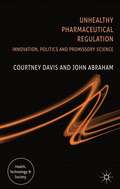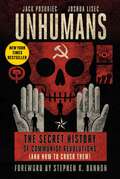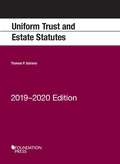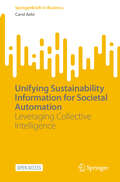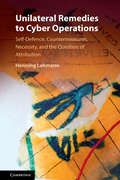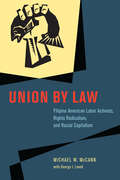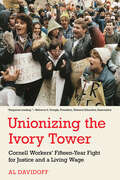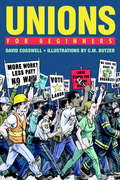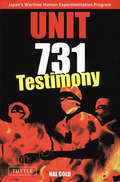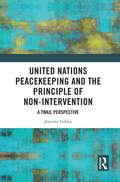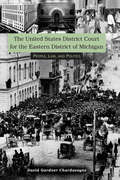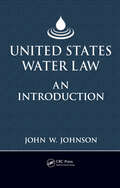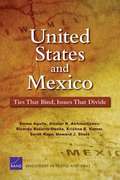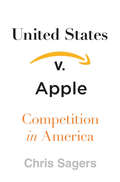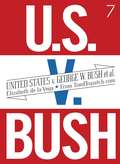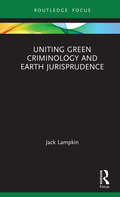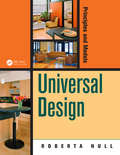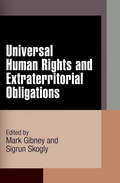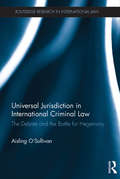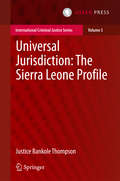- Table View
- List View
Unforgotten: Betrayal, Keep Me Close, And Unforgotten (The\unremembered Ser. #2)
by Clare FrancisA courtroom drama of deceit and family secrets set in the heart of London from international bestselling author Clare Francis Lawyer Hugh Gwynne is in the throes of his most difficult court case yet: His client Tom Deacon was in a car accident in which he witnessed the death of his young daughter . . . Since the crash, Deacon claims to be suffering from trauma and flashbacks, and the case seems poised for victory as a result of Deacon's PTSD. But when an anonymous letter arrives for Gwynne, the case takes an unexpected turn that will force the lawyer to make his most difficult decision yet. Thus far, Gwynne has had what he considers a noble and idyllic life, replete with a golden wife and two adopted children. In one night, could everything come crashing down?
Unhealthy Pharmaceutical Regulation
by Courtney Davis John AbrahamEuropean and American drug regulators govern a multi-billion-dollar pharmaceutical industry selling its products on the world's two largest medicines markets. This is the first book to investigate how effectively American and supranational EU governments have regulated innovative pharmaceuticals regarding public health during the neo-liberal era of the last 30 years. Drawing on years of fieldwork, the authors demonstrate that pharmaceutical regulation and innovation have been misdirected by commercial interests and misconceived ideologies, which induced a deregulatory political culture contrary to health interests. They dismantle the myth that pharmaceutical innovations necessarily equate with therapeutic advances and explain how it has been perpetuated in the interests of industry by corporate bias within the regulatory state, unwarranted expectations of promissory science, and the emergent patient-industry complex. Endemic across both continents, the misadventures of pharmaceutical deregulation are shown to span many therapeutic areas, including cancer, diabetes and irritable bowel syndrome. The authors propose political changes needed to redirect pharmaceutical regulation in the interests of health.
Unhumans: The Secret History of Communist Revolutions (and How to Crush Them)
by Jack Posobiec Joshua LisecUSA TODAY and PUBLISHERS WEEKLY NATIONAL BESTSELLER If you don&’t understand communist revolutions, you aren&’t ready for what&’s coming. The old rules are over. The old order is over. Accusations are evidence. Activism means bigotry and hate. Criminals are allowed to roam free. Citizens are locked up. An appetite for vengeance is unleashed—to deplatform, debank, destroy. This is the daily news, yet none of it&’s new. Patterns from the past make sense of our present. They also foretell a terrifying future we might be condemned to endure. For nearly 250 years, far-left uprisings have followed the same battle plans—from the first call for change to last innocent executed, from denial a revolution is even happening to declaration of the new order. Unhumans takes readers on a shocking, sweeping, and succinct journey through history to share the untold stories of radical takeovers that textbooks don&’t teach. And there is one conclusion: We're in a new revolution right now. But this is not a book about ideology or politics. Unhumans reveals that communism, socialism, Marxism, and all other radical-isms are not philosophies but tactics—tactics that are specifically designed to unleash terror on everyday people and revoke their human rights to life, liberty, and property. These are the forces of unhumanity. This is what they do. Every. Single. Time. Unhumans steals their playbook, breaks apart their strategies piece by piece, and lays out the tactics of what it takes to fight back—and win, using real-world examples. Unhumans is an essential read for every concerned citizen both in the US and worldwide. We must stop what is coming.
Uniform Trust and Estate Statutes (Selected Statutes)
by Thomas P. GallanisThis statutory supplement is ideal for use in basic and advanced courses in trusts and estates and for practitioner reference. The 2019-2020 edition includes the updated text and official comments of the Uniform Probate Code, Uniform Trust Code, and more than a dozen other acts relating to the field of trusts and estates, including the Uniform Fiduciary Income and Principal Act (and its predecessor Uniform Principal and Income Act), Uniform Parentage Act 2017, Uniform Directed Trust Act, Uniform Trust Decanting Act, Revised Uniform Fiduciary Access to Digital Assets Act, Uniform Powers of Appointment Act, Uniform Principal and Income Act, Uniform Prudent Investor Act, Uniform Custodial Trust Act, Revised Uniform Anatomical Gift Act, Uniform Prudent Management of Institutional Funds Act, Uniform Premarital and Marital Agreements Act, Uniform Health-Care Decisions Act, Uniform Simultaneous Death Act, Uniform Transfers to Minors Act, Model Marital Property Act, Model Protection of Charitable Assets Act, and the amendments to the Uniform Fraudulent Transfer Act which is now renamed the Uniform Voidable Transactions Act. The book includes relevant provisions of the Restatement Third of Trusts and Restatement Third of Property, as well as selected prior versions of sections of the Uniform Probate Code. The book is ideal for teaching basic and advanced courses in trusts and estates. It is also ideal for practitioner reference.
Unifying Sustainability Information for Societal Automation: Leveraging Collective Intelligence (SpringerBriefs in Business)
by Carol AebiThis open access book offers a structured approach that aligns indicators of social value and provides a stable foundation amidst the dynamic and ever-changing social complexities. From detailed system scales of participation to an overview of how it works, this book presents a roadmap for automating data in systemic alignment with social value. With its adaptability to changing societal structures, it provides a pragmatic solution within existing systems while paving the way for future advancements. It is valuable for researchers and business leaders.
Unilateral Remedies to Cyber Operations: Self-Defence, Countermeasures, Necessity, and the Question of Attribution
by Henning LahmannAddressing both scholars of international law and political science as well as decision makers involved in cybersecurity policy, the book tackles the most important and intricate legal issues that a state faces when considering a reaction to a malicious cyber operation conducted by an adversarial state. While often invoked in political debates and widely analysed in international legal scholarship, self-defence and countermeasures will often remain unavailable to states in situations of cyber emergency due to the pervasive problem of reliable and timely attribution of cyber operations to state actors. Analysing the legal questions surrounding attribution in detail, the book presents the necessity defence as an evidently available alternative. However, the shortcomings of the doctrine as based in customary international law that render it problematic as a remedy for states are examined in-depth. In light of this, the book concludes by outlining a special emergency regime for cyberspace.
Union by Law: Filipino American Labor Activists, Rights Radicalism, and Racial Capitalism (Chicago Series in Law and Society)
by George I. Lovell Michael W. McCannLaborers in American West Coast agricultural fields and Alaska salmon canneries. There, they found themselves confined to exploitative low-wage jobs in racially segregated workplaces as well as subjected to vigilante violence and other forms of ethnic persecution. In time, though, Filipino workers formed political organizations and affiliated with labor unions to represent their interests and to advance their struggles for class, race, and gender-based social justice. Union by Law analyzes the broader social and legal history of Filipino American workers’ rights-based struggles, culminating in the devastating landmark Supreme Court ruling, Wards Cove Packing Co. v. Atonio (1989). Organized chronologically, the book begins with the US invasion of the Philippines and the imposition of colonial rule at the dawn of the twentieth century. The narrative then follows the migration of Filipino workers to the United States, where they mobilized for many decades within and against the injustices of American racial capitalist empire that the Wards Cove majority willfully ignored in rejecting their longstanding claims. This racial innocence in turn rationalized judicial reconstruction of official civil rights law in ways that significantly increased the obstacles for all workers seeking remedies for institutionalized racism and sexism. A reclamation of a long legacy of racial capitalist domination over Filipinos and other low-wage or unpaid migrant workers, Union by Law also tells a story of noble aspirational struggles for human rights over several generations and of the many ways that law was mobilized both to enforce and to challenge race, class, and gender hierarchy at work.
Unionizing the Ivory Tower: Cornell Workers' Fifteen-Year Fight for Justice and a Living Wage
by Al DavidoffUnionizing the Ivory Tower chronicles how a thousand low-paid custodians, cooks, and gardeners succeeded in organizing a union at Cornell University. Al Davidoff, the Cornell student leader who became a custodian and the union's first president, tells the extraordinary story of these ordinary workers with passion, sensitivity, and wit.His memoir reveals how they took on the dominant power in the community, built a strong organization, and waged multiple strikes and campaigns for livable wages and their dignity. Their strategies and tactics were creative and feisty, founded on worker participation and ownership.The union's commitment to fairness, equity, and economic justice also engaged these workers—mostly rural, white, and conservative—at the intersections of racism, sexism, classism, and homophobia. Davidoff's story demonstrates how a fighting union can activate today's working class to oppose antidemocratic and white supremacist forces.
Unions For Beginners
by David CogswellIt is a time when unions have returned to the front pages of newspapers and blogs and demonstrators are in the streets of America every day. It is a time when the right wing has tried to strike the final blow against what remains of the right to collective bargaining. It is a time when millions of members of the middle class are falling through the cracks in a downward economic trend that parallels the decline of unions. It is this time when people are turning again to the history of unions. Unions For Beginners provides an introduction to that essential history. Written and profusely illustrated in the user-friendly, accessible style of the For Beginners series, Unions For Beginners lays down a simple presentation of the colorful epic story of the struggle of working people to rise from lives dominated by toil and underpaid work to becoming full-fledged participants in the American dream they helped to build. Unions For Beginners presents the history of unions and the labor movement, the principles underlying union organizing, the decline of unions in the shadow of the rising corporate state, and the resurgence in the 21st century of union activism.
Unit 731
by Hal GoldThis is a riveting and disturbing account of the medical atrocities performed in Japan during WWII.In the first part of Unit 731: Testimony, author Hal Gold draws upon a painstakingly accumulated reservoir of sources to construct a portrait of the Imperial Japanese Army's most notorious medical unit, giving an overview of its history and detailing its most shocking activities. The second half of the book consists almost entirely of the words of former unit members themselves, taken from remarks they made at a traveling Unit 731 exhibition held around Japan in 1994-95.
Unit 731
by Hal GoldThis is a riveting and disturbing account of the medical atrocities performed in Japan during WWII.In the first part of Unit 731: Testimony, author Hal Gold draws upon a painstakingly accumulated reservoir of sources to construct a portrait of the Imperial Japanese Army's most notorious medical unit, giving an overview of its history and detailing its most shocking activities. The second half of the book consists almost entirely of the words of former unit members themselves, taken from remarks they made at a traveling Unit 731 exhibition held around Japan in 1994-95.
United Nations Peacekeeping and the Principle of Non-Intervention: A TWAIL Perspective
by Jennifer GiblinUsing a unique application of Third World Approaches to International Law (TWAIL), this book provides a critical, interdisciplinary, examination of the contemporary practice of UN peacekeeping.Is peacekeeping intervention? Since its conception in the mid-1950s, peacekeeping has significantly evolved from traditional, lightly armed, passive operations to robust, multi-dimensional stabilisation peacekeeping operations. This raises questions as to whether this is simply a natural evolution of peacekeeping or whether it marks an expansion of the concept beyond its boundaries, pushing it into the realm of peace enforcement or intervention. In response, this book examines the frameworks which govern UN peacekeeping and seeks to understand the relationship between peacekeeping and the principle of non-intervention. Providing practical examples from the United Nations’ operations in the Democratic Republic of the Congo and drawing upon interviews with key international actors including UN personnel, the book explores the boundaries of peacekeeping, contending that peacekeeping, at times, becomes a form of intervention. This, the book argues, is detrimental both to the concept of peacekeeping and to the host state, and it concludes by offering a series of recommendations to re-affirm peacekeeping’s boundaries and amplify the effectiveness of contemporary peacekeeping. This book will be of interest to scholars and students in international law, international relations, politics, history and criminology.
United States District Court for the Eastern District of Michigan: People, Law, and Politics
by David Gardner ChardavoyneA chronological history of the United States District Court for the Eastern District of Michigan, from its beginnings in the 1830s to the present.
United States Law (Student Text)
by Kristina SwannThe Student Text features four easy-to-read chapters that focus on the laws and court systems of the United States. Students will be able to describe the basic structure and functions of the judicial branch of the U.S. government and the U.S. Supreme Court; explain the difference between trial courts and courts of appeals; and describe the trial process and its participants.
United States Migrant Interdiction and the Detention of Refugees in Guantánamo Bay
by Azadeh DastyariThis book provides a thorough legal analysis of the United States Migrant Interdiction Program, examining the United States' compliance with its obligations under municipal and international law as it interdicts individuals at sea, conducts status determinations, and returns those interdicted to their home countries. This book also examines the rights of the small number of refugees and individuals at risk of torture detained in Guantánamo Bay, Cuba, awaiting resettlement in third countries. Policy-makers, students and scholars will benefit from this book's clarification of the legal obligations of nations engaged in extraterritorial status determination and detention, as well as its blueprint for compliance with international human rights and refugee law. As the first book of its kind devoted to the United States' interdiction program, this work represents an important contribution to scholarship in refugee law and policy, U.S. constitutional law, international maritime law, and international human rights law. Presents the only detailed contemporary legal analysis of the US Migrant Interdiction Program including refugee detainment at Guantánamo Bay, Cuba. Addresses an important and misunderstood feature of US immigration law. Clarifies the legal obligations of nations engaged in extraterritorial detention under international human rights and refugee law.
United States Water Law: An Introduction
by John W. JohnsonA Vital Explanation of Water Law and PolicyBecause demand for and access to quality water far exceeds the current supply, it is increasingly critical to understand the state and federal laws and policies that govern water rights. From farming, fishing, and biology to manufacturing, mine operation, and public water supply, water regulation affects a
United States and Mexico: Ties That Bind, Issues That Divide
by Howard J. Shatz Emma Aguila Alisher R. Akhmedjonov Ricardo Basurto-Davila Krishna B. Kumar Sarah KupsDespite geographical closeness and many shared economic interests, the United States and Mexico remain wary of one another. Policies designed to curtail the number of Mexican immigrants entering into the United States, a 700-mile-long border fence between the two countries, an increasing illegal drug trade, and continually troubled trucking legislation have somewhat eclipsed the North American Free Trade Agreement's (NAFTA's) cooperative scope. Additionally, the current international economic crisis has put any positive renegotiations between the United States and Mexico on hold. However, to ensure that the economic and political relationship between the two countries is as mutually beneficial as it is sustainable, it is critical that Mexico and the United States reiterate their commitment to their important relationship. This book focuses on how the alliance between the United States and Mexico can be made stronger, combining approaches from economics, demography, and sociology, discussions with U. S. and Mexican policymakers, reviews of published work, and results from opinion surveys. Whether relations between the two countries improve or deteriorate depends on the policies adopted by the current U. S. and Mexican administrations. New leaders in both countries are in a position to tackle common interests and take advantage of new opportunities without the baggage of past missteps and suspicions. --Publisher description.
United States v. Apple: Competition in America
by Chris SagersIn 2012, when the Justice Department sued Apple and five book publishers for price fixing, many observers sided with the defendants. It was a reminder that, in practice, Americans are ambivalent about competition. Chris Sagers shows why protecting price competition, even when it hurts some of us, is crucial if antitrust law is to preserve markets.
United States v. G. W. Bush et al.
by Elizabeth De La VegaWhat if there were a fraud worse than Enron and no one did anything about it?In United States v. George W. Bush et. al., former federal prosecutor Elizabeth de la Vega brings her twenty years of experience and her passion for justice to the most important case of her career. The defendants are George W Bush, Richard Cheney, Donald Rumsfeld, Condoleezza Rice, and Colin Powell. The crime is tricking the nation into war, or, in legal terms, conspiracy to defraud the United States.Ms. de la Vega has reviewed the evidence, researched the law, drafted an indictment, and in this lively, accessible book, presented it to a grand jury. If the indictment and grand jury are both hypothetical, the facts are tragically real: Over half of all Americans believe the president misled the country into a war that has left 2,500 hundred American soldiers and countless Iraqis dead. The cost is $350 billion -- and counting.The legal question is: Did the president and his team use the same techniques as those used by Enron's Ken Lay, Jeffrey Skilling, and fraudsters everywhere -- false pretenses, half-truths, deliberate omissions -- in order to deceive Congress and the American public?Take advantage of this rare opportunity to "sit" with the grand jurors as de la Vega presents a case of prewar fraud that should persuade any fair-minded person who loves this country as much as she so obviously does. Faced with an ongoing crime of such magnitude, she argues, we can not simply shrug our shoulders and walk away.
United States vs. the Cuban Five: A Judicial Coverup
by Rodolfo Dávalos FernándezTheir crime was keeping the government of Cuba informed of the activities of counter-revolutionary terrorist groups in Miami whose unbroken record of violent attacks on Cuba and supporters of the Cuban Revolution begins in the 1960s and continues to this day.
Uniting Green Criminology and Earth Jurisprudence
by Jack LampkinAs planet Earth continues to absorb unprecedented levels of anthropogenically induced environmental and climatic change, two similar academic schools of thought have emerged in recent years, both making sustained efforts to explain how and why this state of affairs has evolved. These two disciplines are known as green criminology and earth jurisprudence. Whilst these areas of study can be seen as sub-disciplines of their parent subjects, law and criminology, this book proposes that much can be achieved by authors uniting and collaborating on their academic work. By doing this, it is argued that green criminology stands to benefit from a discipline that places mother nature at the heart of lawmaking and therefore providing a solution to the environmental harms identified by green criminologists. Furthermore, earth jurisprudence will profit from utilising the breadth of academic work produced within the green criminology academic arena. Therefore, this book seeks to unite green criminology and earth jurisprudence in an effort to find solutions to the extraordinary environmental problems that the world now faces.
Universal Design: Principles and Models
by Roberta NullAs the baby boom generation ages, it is crucial that designers understand all they can about bringing this group, as well as all others, design that will offer function, aesthetics, and quality of life. Full of examples and illustrated with pictures of good design, Universal Design: Principles and Models details how the principles of universal desi
Universal Human Rights and Extraterritorial Obligations
by Mark Gibney Sigrun SkoglyGlobalization challenges fundamental principles governing international law, especially with respect to state sovereignty and international relations. This transformation has had a significant impact on the practice of trade law, financial regulation, and environmental law but relatively little effect on one area of law and regulation: human rights.Universal Human Rights and Extraterritorial Obligations examines both the international and domestic foundations of human rights law. What other contemporary human rights debates have almost totally ignored is that in an increasingly interdependent world--where public and private international actors have great influence on the lives of individuals everywhere--it is insufficient to assess only the record of domestic governments in human rights. It is equally important to assess the effect of actions taken by intergovernmental organizations, international private entities, and foreign states.From this standpoint, contributors to this book address how states' actions or omissions may affect the prospects of individuals in foreign states and asks important questions: To what extent do agricultural policies of rich countries influence the right to food in poorer countries? How do decisions to screen asylum seekers outside state borders affect refugee rights? How does cooperation among different states in the "war on terror" influence individuals' rights to be free from torture? This volume presents a brief for a more complex and updated approach to the protection of human rights worldwide.
Universal Jurisdiction in International Criminal Law: The Debate and the Battle for Hegemony (Routledge Research in International Law)
by Aisling O'SullivanWith the sensational arrest of former Chilean dictator Augusto Pinochet in 1998, the rise to prominence of universal jurisdiction over crimes against international law seemed to be assured. The arrest of Pinochet and the ensuing proceedings before the UK courts brought universal jurisdiction into the foreground of the "fight against impunity" and the principle was read as an important complementary mechanism for international justice –one that could offer justice to victims denied an avenue by the limited jurisdiction of international criminal tribunals. Yet by the time of the International Court of Justice’s Arrest Warrant judgment four years later, the picture looked much bleaker and the principle was being read as a potential tool for politically motivated trials. This book explores the debate over universal jurisdiction in international criminal law, aiming to unpack a practice in which international lawyers continue to disagree over the concept of universal jurisdiction. Using Martti Koskenniemi’s work as a foil, this book exposes the argumentative techniques in operation in national and international adjudication since the 1990s. Drawing on overarching patterns within the debate, Aisling O’Sullivan argues that it is bounded by a tension between contrasting political preferences or positions, labelled as moralist ("ending impunity") and formalist ("avoiding abuse") and she reads the debate as a movement of hegemonic and counter-hegemonic positions that struggle for hegemonic control. However, she draws out how these positions (moralist/formalist) merge into one another and this produces a tendency towards a "middle" position that continues to prefer a particular preference (moralist or formalist). Aisling O’Sullivan then traces the transformation towards this tendency that reflects an internal split among international lawyers between building a utopia ("court of humanity") and recognizing its impossibility of being realized.
Universal Jurisdiction: The Sierra Leone Profile
by Bankole ThompsonThe doctrine of universal jurisdiction has evolved throughout modern times in the context of global criminal justice as a paramount agent of combating impunity emanating from international criminality. Sierra Leone, as a member of the international community and the United Nations, has, in recent times, been a pioneer in the progressive application and development of international criminal law in the African region. Despite this role, the country's profile, both in terms of the incorporation and application of the doctrine of universal jurisdiction, is deficient in several major respects falling far short of its dual international obligation not to provide safe havens from justice for perpetrators of international crimes and to combat impunity from such criminogenic acts. Hence, a compelling reason for the author to write this book was to provide a seminal scholarly work on the subject articulating the existing state of the law in Sierra Leone and highlighting the deficiencies in the law and factors inhibiting the exercise of universal jurisdiction in this UN member state. It was also to propose necessary substantive and procedural law reforms in the state's jurisprudence on the subject. The book is recommended reading for practitioners and scholars in international criminal law and related disciplines. Its accessibility is highly enhanced by relevant tables and summaries of each chapter. Justice Rosolu J. B. Thompson is Professor Emeritus of Criminal Justice Studies, Eastern Kentucky University, USA. He was a member of and Presiding Judge in Trial Chamber I of the Special Court for Sierra Leone.

